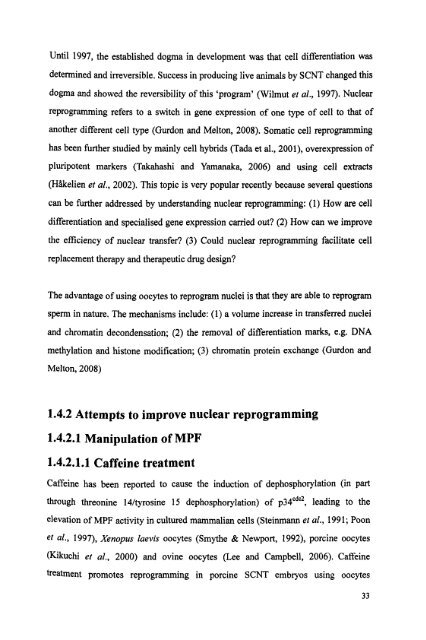-210 Nottingham - Nottingham eTheses - The University of Nottingham
-210 Nottingham - Nottingham eTheses - The University of Nottingham
-210 Nottingham - Nottingham eTheses - The University of Nottingham
Create successful ePaper yourself
Turn your PDF publications into a flip-book with our unique Google optimized e-Paper software.
Until 1997, the established dogma in development was that cell differentiation was<br />
determined and irreversible. Success in producing live animals by SCNT changed this<br />
dogma and showed the reversibility <strong>of</strong> this `program' (Wilmut et al., 1997). Nuclear<br />
reprogramming refers to a switch in gene expression <strong>of</strong> one type <strong>of</strong> cell to that <strong>of</strong><br />
another different cell type (Gurdon and Melton, 2008). Somatic cell reprogramming<br />
has been further studied by mainly cell hybrids (Tada et al., 2001), overexpression <strong>of</strong><br />
pluripotent markers (Takahashi and Yamanaka, 2006) and using cell extracts<br />
(HAkelien et al., 2002). This topic is very popular recently because several questions<br />
can be further addressed by understanding nuclear reprogramming: (1) How are cell<br />
differentiation and specialised gene expression carried out? (2) How can we improve<br />
the efficiency <strong>of</strong> nuclear transfer? (3) Could nuclear reprogramming facilitate cell<br />
replacement therapy and therapeutic drug design?<br />
<strong>The</strong> advantage <strong>of</strong> using oocytes to reprogram nuclei is that they are able to reprogram<br />
sperm in nature. <strong>The</strong> mechanisms include: (1) a volume increase in transferred nuclei<br />
and chromatin decondensation; (2) the removal <strong>of</strong> differentiation marks, e. g. DNA<br />
methylation and histone modification; (3) chromatin protein exchange (Gurdon and<br />
Melton, 2008)<br />
1.4.2 Attempts to improve nuclear reprogramming<br />
1.4.2.1 Manipulation <strong>of</strong> MPF<br />
1.4.2.1.1 Caffeine treatment<br />
Caffeine has been reported to cause the induction <strong>of</strong> dephosphorylation (in part<br />
through threonine 14/tyrosine 15 dephosphorylation) <strong>of</strong> p34odc2, leading to the<br />
elevation <strong>of</strong> MPF activity in cultured mammalian cells (Steinmann et al., 1991; Poon<br />
et al., 1997), Xenopus laevis oocytes (Smythe & Newport, 1992), porcine oocytes<br />
(Kikuchi et al., 2000) and ovine oocytes (Lee and<br />
Campbell, 2006). Caffeine<br />
treatment promotes reprogramming in porcine SCNT embryos using oocytes<br />
33
















